牛津深圳版七年级上册Module 2 The natural world Unit 3 Vocabulary课件(共33张PPT)
文档属性
| 名称 | 牛津深圳版七年级上册Module 2 The natural world Unit 3 Vocabulary课件(共33张PPT) | 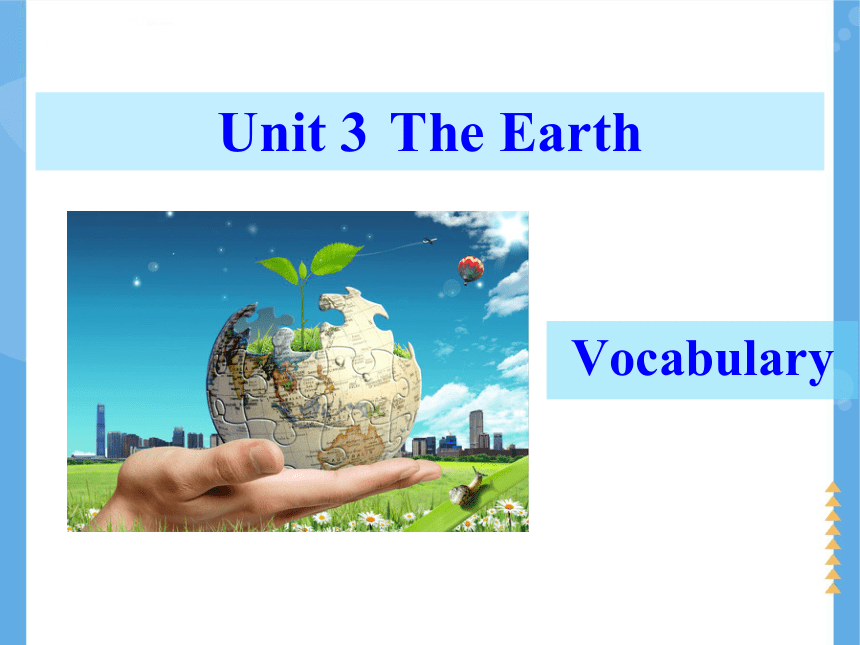 | |
| 格式 | zip | ||
| 文件大小 | 1.9MB | ||
| 资源类型 | 教案 | ||
| 版本资源 | 牛津深圳版 | ||
| 科目 | 英语 | ||
| 更新时间 | 2022-09-08 11:23:45 | ||
图片预览

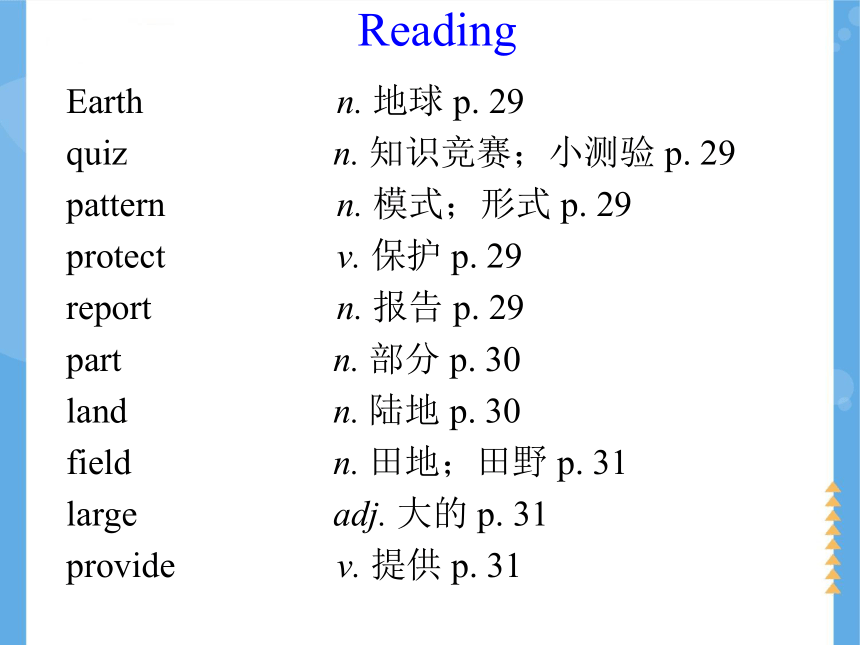
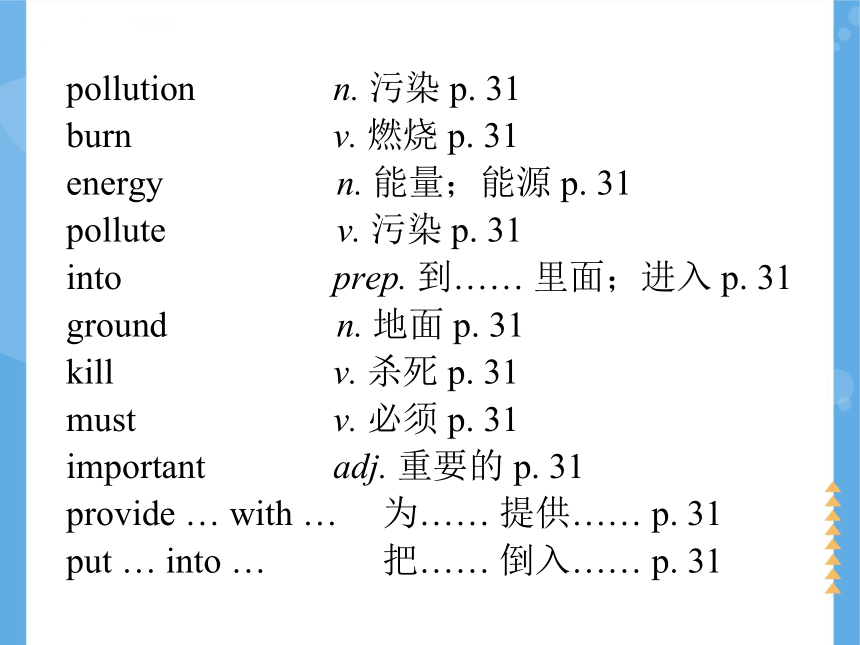
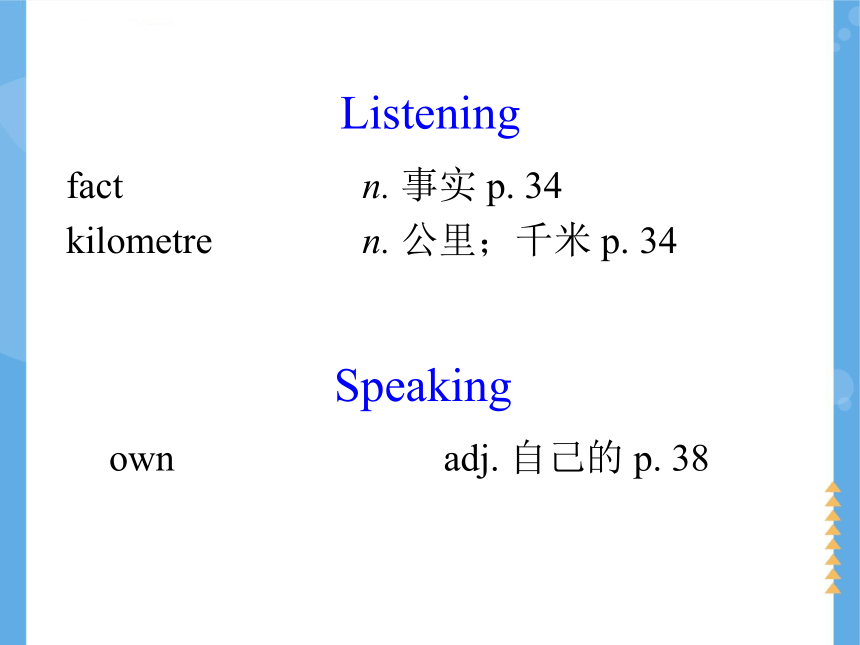
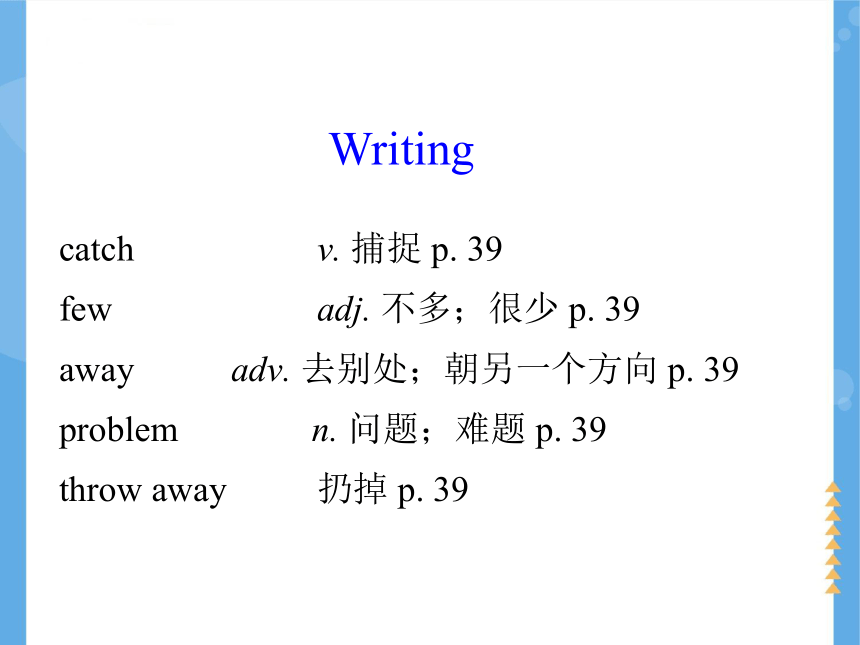
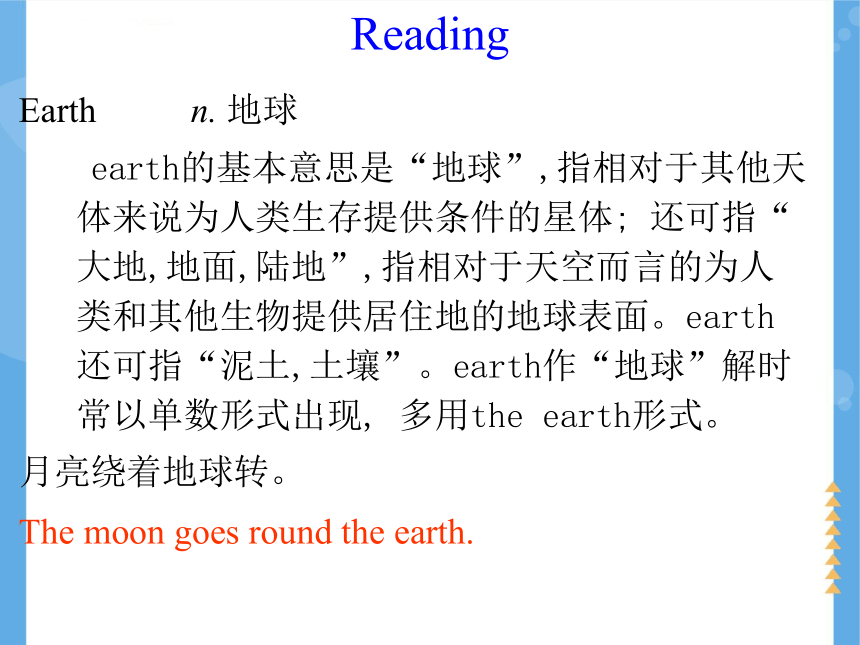
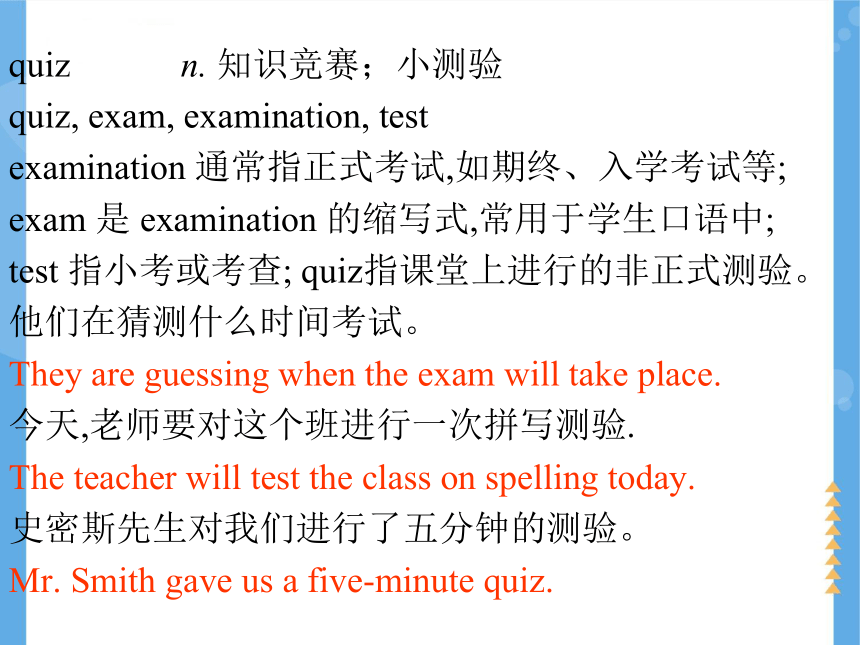
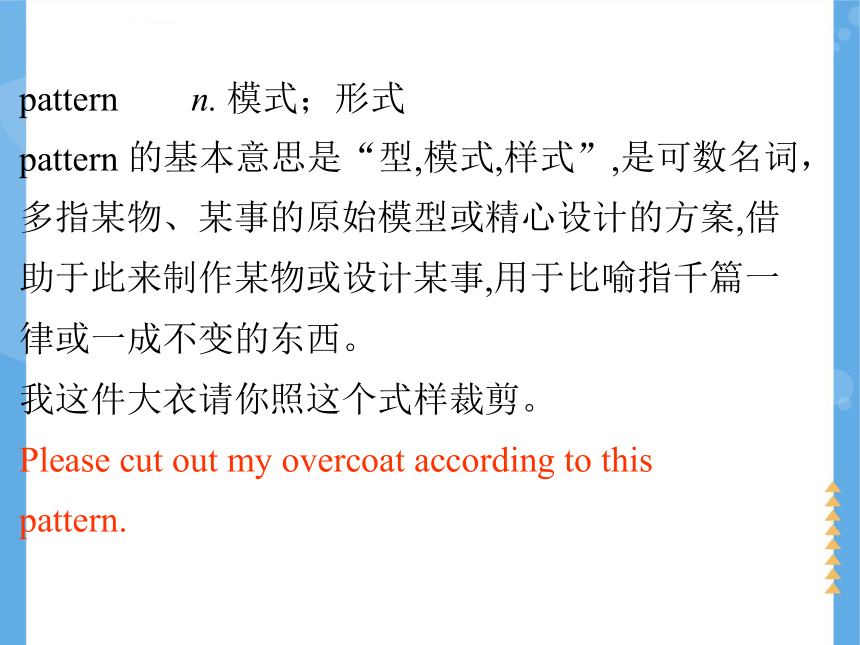
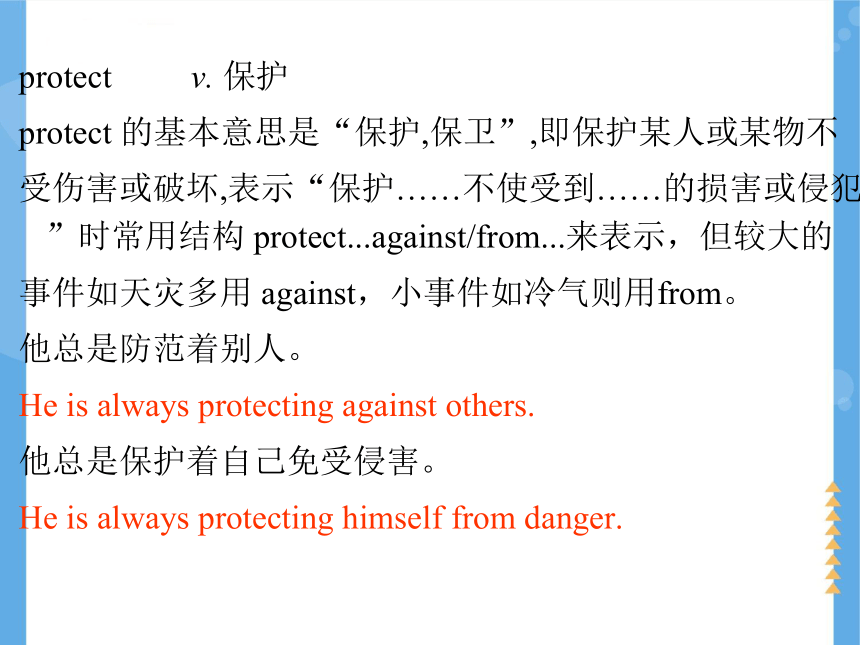
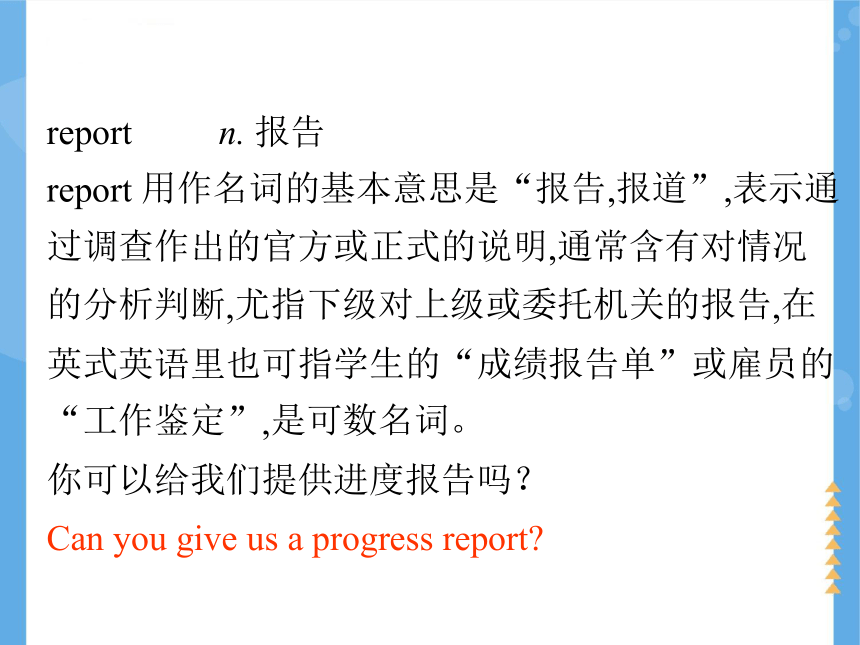
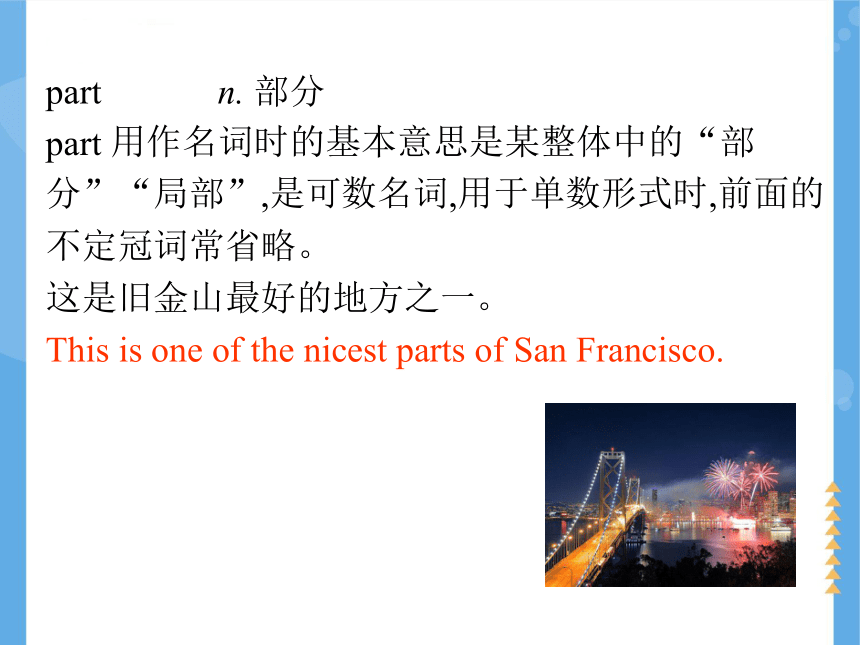
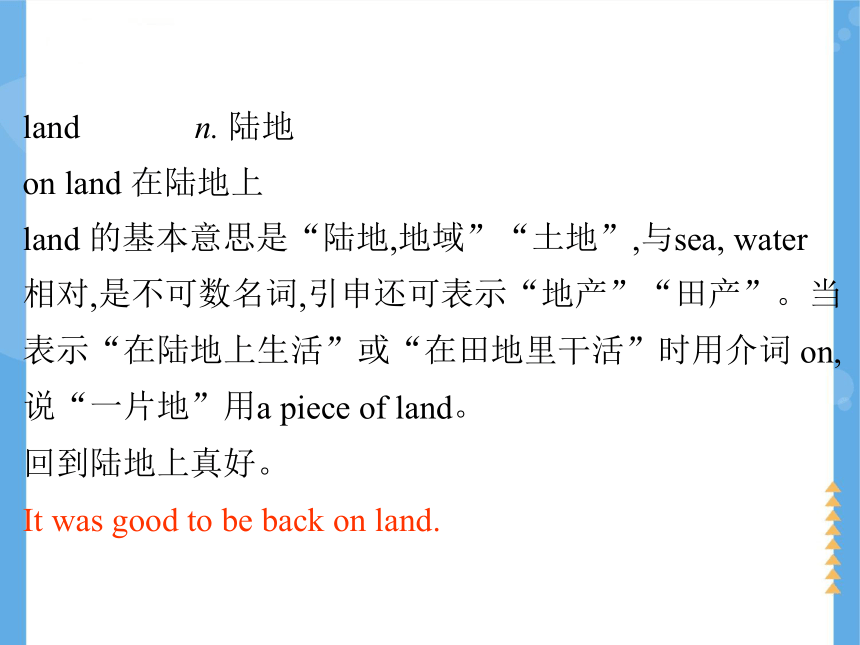
文档简介
(共33张PPT)
Vocabulary
Unit 3 The Earth
Earth n. 地球 p. 29
quiz n. 知识竞赛;小测验 p. 29
pattern n. 模式;形式 p. 29
protect v. 保护 p. 29
report n. 报告 p. 29
part n. 部分 p. 30
land n. 陆地 p. 30
field n. 田地;田野 p. 31
large adj. 大的 p. 31
provide v. 提供 p. 31
Reading
pollution n. 污染 p. 31
burn v. 燃烧 p. 31
energy n. 能量;能源 p. 31
pollute v. 污染 p. 31
into prep. 到…… 里面;进入 p. 31
ground n. 地面 p. 31
kill v. 杀死 p. 31
must v. 必须 p. 31
important adj. 重要的 p. 31
provide … with … 为…… 提供…… p. 31
put … into … 把…… 倒入…… p. 31
fact n. 事实 p. 34
kilometre n. 公里;千米 p. 34
Listening
Speaking
own adj. 自己的 p. 38
catch v. 捕捉 p. 39
few adj. 不多;很少 p. 39
away adv. 去别处;朝另一个方向 p. 39
problem n. 问题;难题 p. 39
throw away 扔掉 p. 39
Writing
Earth n. 地球
earth的基本意思是“地球”,指相对于其他天体来说为人类生存提供条件的星体; 还可指“大地,地面,陆地”,指相对于天空而言的为人类和其他生物提供居住地的地球表面。earth还可指“泥土,土壤”。earth作“地球”解时常以单数形式出现, 多用the earth形式。
月亮绕着地球转。
The moon goes round the earth.
Reading
quiz n. 知识竞赛;小测验
quiz, exam, examination, test
examination 通常指正式考试,如期终、入学考试等;
exam 是 examination 的缩写式,常用于学生口语中;
test 指小考或考查; quiz指课堂上进行的非正式测验。
他们在猜测什么时间考试。
They are guessing when the exam will take place.
今天,老师要对这个班进行一次拼写测验.
The teacher will test the class on spelling today.
史密斯先生对我们进行了五分钟的测验。
Mr. Smith gave us a five-minute quiz.
pattern n. 模式;形式
pattern 的基本意思是“型,模式,样式”,是可数名词,
多指某物、某事的原始模型或精心设计的方案,借
助于此来制作某物或设计某事,用于比喻指千篇一
律或一成不变的东西。
我这件大衣请你照这个式样裁剪。
Please cut out my overcoat according to this
pattern.
protect v. 保护
protect 的基本意思是“保护,保卫”,即保护某人或某物不
受伤害或破坏,表示“保护……不使受到……的损害或侵犯”时常用结构 protect...against/from...来表示,但较大的
事件如天灾多用 against,小事件如冷气则用from。
他总是防范着别人。
He is always protecting against others.
他总是保护着自己免受侵害。
He is always protecting himself from danger.
report n. 报告
report 用作名词的基本意思是“报告,报道”,表示通
过调查作出的官方或正式的说明,通常含有对情况
的分析判断,尤指下级对上级或委托机关的报告,在
英式英语里也可指学生的“成绩报告单”或雇员的
“工作鉴定”,是可数名词。
你可以给我们提供进度报告吗?
Can you give us a progress report
part n. 部分
part 用作名词时的基本意思是某整体中的“部
分”“局部”,是可数名词,用于单数形式时,前面的
不定冠词常省略。
这是旧金山最好的地方之一。
This is one of the nicest parts of San Francisco.
land n. 陆地
on land 在陆地上
land 的基本意思是“陆地,地域”“土地”,与sea, water
相对,是不可数名词,引申还可表示“地产”“田产”。当
表示“在陆地上生活”或“在田地里干活”时用介词 on,
说“一片地”用a piece of land。
回到陆地上真好。
It was good to be back on land.
field n. 田地;田野
表示“在田野里”,介词用in; “在球场上”,介词用on;
“在战场上”,介词用in或on皆可。
许多农民在田里干活。
Many farmers are working in the fields.
孩子们去野餐,在田野上嬉闹。
Children went on a picnic and played in a field.
large adj. 大的
large 通常用来指形状、面积、数量、范围或规模等
方面的“大”,有时也可用来修饰抽象事物如程度、能
力、权力等,表示“广博的,宽大的”“慷慨的,夸张的”
等。
large 通常不指精神上的大,也不形容无形的东西。
广州是一个大城市。
Guangzhou is a large city.
总统是一位经验丰富的人。
The President is a man of large experience.
provide v. 提供
provide 用作及物动词时,可表示“提供,供给,供应,装
备”,后可接名词或代词作简单宾语; 还可接双宾语,常
用介词 for 引出间接宾语,也可用介词 with 引出直接
宾语,有时 with 可省略。
provide for 供养,供给;规定;为…作准备
provide service 提供服务
provide with 供给
provide against 规定禁止;预防
我们来这里是为公众服务。
We are here to provide service for the public.
pollute v. 污染
pollution n. 污染
air pollution 大气污染,空气污染
pollution control 污染控制
她认为这些书腐蚀儿童的心灵。
She thinks these books pollute the minds of children.
今天很多人生病是因为空气污染。
Today, many people get sick because of the air pollution.
burn v. 燃烧
burn out 烧坏;烧尽
burn down 烧毁,火力减弱
burn up 烧起来;烧掉;发怒
burn 的基本意思是“烧”,指“燃烧”(自燃或人为点燃),
也可指“烧伤”(各种原因如烧、烫、烤等及各种程
度)。引申则可表示“情绪激动”(如怒火中烧)。
昨天一场大火烧毁了森林。
A big fire burnt the forest yesterday.
energy n. 能量;能源
energy saving 节能,能源节省
solar energy 太阳能
new energy 新能源
青年人通常比老年人精力充沛。
Young people usually have more energy than the old.
into prep. 到…… 里面;进入
小偷在夜间破门进入住宅。
The thief broke into the house during the night.
ground n. 地面
地面潮湿时就不应该坐在地上。
You shouldn't sit on the ground when it's wet.
kill v. 杀死
kill 的基本意思是“使终止”,或指通过某种手段使某人
或某物失去生命,即“杀死”。kill 可指任何形式的“杀
死”,可以是有意的,也可以是无意的,关键是“杀而死”,
是终结性的,多指“死于非命”。
kill 的主语既可以是人(个体的人或集团的人),也可以
是动物或任何无生命的事物,如战争、灾害等。
他的妻子在车祸中丧生。
His wife was killed in a car accident.
must modal v. 必须
must 表示义务或强制,含意是“必须”“应当”; 其否定结构
表示“不许可”或“不应该”; 用于一般疑问句时,表示征求对方的意见,其肯定答语用 Yes, please 或 I’m afraid so,否定答语用 needn’t 或 don‘t have to; must在间接引语中表过去。
在英国,车辆必须靠左行驶。
In England traffic must keep to the left.
—我明天必须去吗?
—是的,要去。/不是,不需要。
--Must I go tomorrow
--Yes, please. / No, you needn’t.
important adj. 重要的
more important 更加重要
play an important role 起到重要作用
important 形容事物时表示“重大,重要,紧急”; 形容人
时表示“有权力(地位)” “自以为了不起”,在句中一般
用作定语、表语。
他们跟她谈论一件重要事情。
They discussed an important matter with her.
provide … with … 为…… 提供……
书给孩子们以思想。
Books provide children with ideas.
put … into … 把…… 倒入……
他很快地把钱放进口袋了。
He quickly put the money into his pocket.
fact n. 事实
in fact 事实上,实际上
matter of fact n. 事实
fact 作“事实”解时是可数名词,作“真实情况”解时,是
不可数名词。
我能查出事实的真相。
I can find out the truth of the fact.
Listening
kilometre n. 公里;千米
这座桥差不多有两公里长。
The bridge is almost 2 kilometres long.
Speaking
own adj. 自己的
她的衣服都是她自己做的。
She makes all her own clothes.
catch v. 捕捉
catch 的基本意思是“抓住”,指通过追踪、计谋、武力
或突然袭击等方式抓住运动着的或隐藏的某人或某
物。引申可指“吸引”某人的注意力。
小偷逃跑时,警察把他抓住了。
The police caught the thief as he ran.
Writing
few adj. 不多;很少
few 强调“少”,表示否定的意思;
a few表示肯定,意为 “一些;几个”,强调“有”。
房间里没几个人。(虽有但少)
There are few people in the room.
房间里有几个人。(虽少但有)
There are a few people in the room.
away adv. 去别处;朝另一个方向
鸟儿飞走了。
Some birds flew away.
problem n. 问题;难题
problem 做“问题”解时,常指客观存在的并有待解
决的困难或问题,也可指数字、事实等方面的问题
习题或思考题。
我问他有何困难。
I asked him what his problem was.
throw away 扔掉
把香烟扔掉! 吸烟对你有害。
Throw away the cigarette ! Smoking is bad for
you.
Earth
quiz
pattern
protect
report
part
land
field
large
Dictation
地球
知识竞赛;小测验
模式;形式
保护
报告
部分
陆地
田地;田野
大的
提供
污染
燃烧
能量;能源
污染
到…… 里面;进入
地面
杀死
必须
provide
pollution
burn
energy
pollute
into
ground
kill
must
重要的
为…… 提供……
把…… 倒入……
事实
公里;千米
自己的
important
provide … with …
put … into …
fact
kilometre
own
Thank you!
Vocabulary
Unit 3 The Earth
Earth n. 地球 p. 29
quiz n. 知识竞赛;小测验 p. 29
pattern n. 模式;形式 p. 29
protect v. 保护 p. 29
report n. 报告 p. 29
part n. 部分 p. 30
land n. 陆地 p. 30
field n. 田地;田野 p. 31
large adj. 大的 p. 31
provide v. 提供 p. 31
Reading
pollution n. 污染 p. 31
burn v. 燃烧 p. 31
energy n. 能量;能源 p. 31
pollute v. 污染 p. 31
into prep. 到…… 里面;进入 p. 31
ground n. 地面 p. 31
kill v. 杀死 p. 31
must v. 必须 p. 31
important adj. 重要的 p. 31
provide … with … 为…… 提供…… p. 31
put … into … 把…… 倒入…… p. 31
fact n. 事实 p. 34
kilometre n. 公里;千米 p. 34
Listening
Speaking
own adj. 自己的 p. 38
catch v. 捕捉 p. 39
few adj. 不多;很少 p. 39
away adv. 去别处;朝另一个方向 p. 39
problem n. 问题;难题 p. 39
throw away 扔掉 p. 39
Writing
Earth n. 地球
earth的基本意思是“地球”,指相对于其他天体来说为人类生存提供条件的星体; 还可指“大地,地面,陆地”,指相对于天空而言的为人类和其他生物提供居住地的地球表面。earth还可指“泥土,土壤”。earth作“地球”解时常以单数形式出现, 多用the earth形式。
月亮绕着地球转。
The moon goes round the earth.
Reading
quiz n. 知识竞赛;小测验
quiz, exam, examination, test
examination 通常指正式考试,如期终、入学考试等;
exam 是 examination 的缩写式,常用于学生口语中;
test 指小考或考查; quiz指课堂上进行的非正式测验。
他们在猜测什么时间考试。
They are guessing when the exam will take place.
今天,老师要对这个班进行一次拼写测验.
The teacher will test the class on spelling today.
史密斯先生对我们进行了五分钟的测验。
Mr. Smith gave us a five-minute quiz.
pattern n. 模式;形式
pattern 的基本意思是“型,模式,样式”,是可数名词,
多指某物、某事的原始模型或精心设计的方案,借
助于此来制作某物或设计某事,用于比喻指千篇一
律或一成不变的东西。
我这件大衣请你照这个式样裁剪。
Please cut out my overcoat according to this
pattern.
protect v. 保护
protect 的基本意思是“保护,保卫”,即保护某人或某物不
受伤害或破坏,表示“保护……不使受到……的损害或侵犯”时常用结构 protect...against/from...来表示,但较大的
事件如天灾多用 against,小事件如冷气则用from。
他总是防范着别人。
He is always protecting against others.
他总是保护着自己免受侵害。
He is always protecting himself from danger.
report n. 报告
report 用作名词的基本意思是“报告,报道”,表示通
过调查作出的官方或正式的说明,通常含有对情况
的分析判断,尤指下级对上级或委托机关的报告,在
英式英语里也可指学生的“成绩报告单”或雇员的
“工作鉴定”,是可数名词。
你可以给我们提供进度报告吗?
Can you give us a progress report
part n. 部分
part 用作名词时的基本意思是某整体中的“部
分”“局部”,是可数名词,用于单数形式时,前面的
不定冠词常省略。
这是旧金山最好的地方之一。
This is one of the nicest parts of San Francisco.
land n. 陆地
on land 在陆地上
land 的基本意思是“陆地,地域”“土地”,与sea, water
相对,是不可数名词,引申还可表示“地产”“田产”。当
表示“在陆地上生活”或“在田地里干活”时用介词 on,
说“一片地”用a piece of land。
回到陆地上真好。
It was good to be back on land.
field n. 田地;田野
表示“在田野里”,介词用in; “在球场上”,介词用on;
“在战场上”,介词用in或on皆可。
许多农民在田里干活。
Many farmers are working in the fields.
孩子们去野餐,在田野上嬉闹。
Children went on a picnic and played in a field.
large adj. 大的
large 通常用来指形状、面积、数量、范围或规模等
方面的“大”,有时也可用来修饰抽象事物如程度、能
力、权力等,表示“广博的,宽大的”“慷慨的,夸张的”
等。
large 通常不指精神上的大,也不形容无形的东西。
广州是一个大城市。
Guangzhou is a large city.
总统是一位经验丰富的人。
The President is a man of large experience.
provide v. 提供
provide 用作及物动词时,可表示“提供,供给,供应,装
备”,后可接名词或代词作简单宾语; 还可接双宾语,常
用介词 for 引出间接宾语,也可用介词 with 引出直接
宾语,有时 with 可省略。
provide for 供养,供给;规定;为…作准备
provide service 提供服务
provide with 供给
provide against 规定禁止;预防
我们来这里是为公众服务。
We are here to provide service for the public.
pollute v. 污染
pollution n. 污染
air pollution 大气污染,空气污染
pollution control 污染控制
她认为这些书腐蚀儿童的心灵。
She thinks these books pollute the minds of children.
今天很多人生病是因为空气污染。
Today, many people get sick because of the air pollution.
burn v. 燃烧
burn out 烧坏;烧尽
burn down 烧毁,火力减弱
burn up 烧起来;烧掉;发怒
burn 的基本意思是“烧”,指“燃烧”(自燃或人为点燃),
也可指“烧伤”(各种原因如烧、烫、烤等及各种程
度)。引申则可表示“情绪激动”(如怒火中烧)。
昨天一场大火烧毁了森林。
A big fire burnt the forest yesterday.
energy n. 能量;能源
energy saving 节能,能源节省
solar energy 太阳能
new energy 新能源
青年人通常比老年人精力充沛。
Young people usually have more energy than the old.
into prep. 到…… 里面;进入
小偷在夜间破门进入住宅。
The thief broke into the house during the night.
ground n. 地面
地面潮湿时就不应该坐在地上。
You shouldn't sit on the ground when it's wet.
kill v. 杀死
kill 的基本意思是“使终止”,或指通过某种手段使某人
或某物失去生命,即“杀死”。kill 可指任何形式的“杀
死”,可以是有意的,也可以是无意的,关键是“杀而死”,
是终结性的,多指“死于非命”。
kill 的主语既可以是人(个体的人或集团的人),也可以
是动物或任何无生命的事物,如战争、灾害等。
他的妻子在车祸中丧生。
His wife was killed in a car accident.
must modal v. 必须
must 表示义务或强制,含意是“必须”“应当”; 其否定结构
表示“不许可”或“不应该”; 用于一般疑问句时,表示征求对方的意见,其肯定答语用 Yes, please 或 I’m afraid so,否定答语用 needn’t 或 don‘t have to; must在间接引语中表过去。
在英国,车辆必须靠左行驶。
In England traffic must keep to the left.
—我明天必须去吗?
—是的,要去。/不是,不需要。
--Must I go tomorrow
--Yes, please. / No, you needn’t.
important adj. 重要的
more important 更加重要
play an important role 起到重要作用
important 形容事物时表示“重大,重要,紧急”; 形容人
时表示“有权力(地位)” “自以为了不起”,在句中一般
用作定语、表语。
他们跟她谈论一件重要事情。
They discussed an important matter with her.
provide … with … 为…… 提供……
书给孩子们以思想。
Books provide children with ideas.
put … into … 把…… 倒入……
他很快地把钱放进口袋了。
He quickly put the money into his pocket.
fact n. 事实
in fact 事实上,实际上
matter of fact n. 事实
fact 作“事实”解时是可数名词,作“真实情况”解时,是
不可数名词。
我能查出事实的真相。
I can find out the truth of the fact.
Listening
kilometre n. 公里;千米
这座桥差不多有两公里长。
The bridge is almost 2 kilometres long.
Speaking
own adj. 自己的
她的衣服都是她自己做的。
She makes all her own clothes.
catch v. 捕捉
catch 的基本意思是“抓住”,指通过追踪、计谋、武力
或突然袭击等方式抓住运动着的或隐藏的某人或某
物。引申可指“吸引”某人的注意力。
小偷逃跑时,警察把他抓住了。
The police caught the thief as he ran.
Writing
few adj. 不多;很少
few 强调“少”,表示否定的意思;
a few表示肯定,意为 “一些;几个”,强调“有”。
房间里没几个人。(虽有但少)
There are few people in the room.
房间里有几个人。(虽少但有)
There are a few people in the room.
away adv. 去别处;朝另一个方向
鸟儿飞走了。
Some birds flew away.
problem n. 问题;难题
problem 做“问题”解时,常指客观存在的并有待解
决的困难或问题,也可指数字、事实等方面的问题
习题或思考题。
我问他有何困难。
I asked him what his problem was.
throw away 扔掉
把香烟扔掉! 吸烟对你有害。
Throw away the cigarette ! Smoking is bad for
you.
Earth
quiz
pattern
protect
report
part
land
field
large
Dictation
地球
知识竞赛;小测验
模式;形式
保护
报告
部分
陆地
田地;田野
大的
提供
污染
燃烧
能量;能源
污染
到…… 里面;进入
地面
杀死
必须
provide
pollution
burn
energy
pollute
into
ground
kill
must
重要的
为…… 提供……
把…… 倒入……
事实
公里;千米
自己的
important
provide … with …
put … into …
fact
kilometre
own
Thank you!
